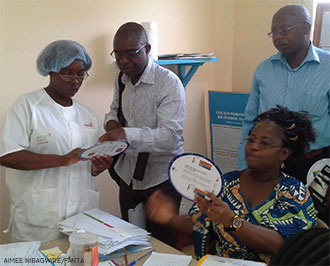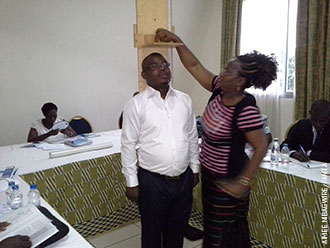This field note shares lessons learned from the use of participatory learning methods in refresher training on nutrition assessment, counseling, and support (NACS) in the Democratic Republic of Congo (DRC) and Côte d’Ivoire in March–April 2015. It describes key stakeholder engagement in training design, the training’s microteaching approach, and its emphasis on hands-on practice. Program managers from ministries of health, nongovernment organizations, implementing partners, and other organizations involved in NACS will find it useful for planning and conducting training.
Background
NACS is a systems-based approach to addressing the nutrition needs of children, pregnant and lactating women, adolescents, and people living with HIV and other chronic infectious diseases. FANTA has supported NACS implementation in health facilities and community support services in many countries, including Côte d’Ivoire, DRC, Ethiopia, Lesotho, Namibia, Malawi, Tanzania, Uganda, and Zambia. As part of implementation of NACS, FANTA has developed NACS training materials and helped to train staff. Generally, a cascade approach known as a “training of trainers” (TOT) is used for NACS training. In the TOT framework, a facilitator trains a group of trainers, who then train frontline health care providers. The TOT is typically provided over the course of 5 days.

Health workers using new BMI wheels. (Photo by Aimee Nibagwire)
In DRC and Côte d’Ivoire, a refresher TOT was conducted for several reasons. First, in both countries various weaknesses were identified in NACS implementation, such as difficulties in assessing nutritional status and providing nutrition counseling. Second, the training needed updating following a strategic shift in priorities at the U.S. President’s Emergency Plan for AIDS Relief (PEPFAR), which supports the health facilities implementing NACS, including a decision to better support engagement, adherence, and retention in antiretroviral therapy for people living with HIV as well as orphans and vulnerable children.
Methodology
The methodology of the NACS refresher TOT in the two countries was based on the following core principles:
- Full participation of key stakeholders in training design and implementation and in planning next steps.
- Use of microteaching techniques to strengthen trainers’ skills. In microteaching, participants practice playing the instructor’s role and present short lessons to small groups of peers. Following these practice teaching sessions, they receive detailed feedback on their performance.
- Emphasis on hands-on activities in the classroom and in the field via a field practicum.
- Skills practice for more than half the duration of the training.
- Practice in providing “supportive supervision” to health care providers during the field practicum. Supportive supervision emphasizes two-way communication and mutual problem-solving to improve performance.
Adhering to these principles enables participants to immerse themselves in the technical content of the training and gives them multiple opportunities to practice their training skills, receive feedback, and make adjustments in a realistic classroom setting.
Preparation
FANTA worked closely with national and provincial Ministry of Health supervisors and PEPFAR implementing partners to plan the training. First, they conducted a needs assessment to identify weaknesses in NACS service delivery and their causes. Then, they selected the relevant training modules to address gaps and updated them for the current local context for use in the refresher TOT (see Box 1). With technical support from FANTA and implementing partners, the stakeholders identified two NACS health facilities for the field practicum and developed a 4–5 day training plan that incorporates microteaching sessions based on the selected modules and devotes 2 full days to the practicum. FANTA arranged for anthropometric and other equipment to be used in the classroom and at the facilities during the field practicum.
Box 1. Weaknesses in NACS Service Delivery and Training Topics to Address Them
| Weaknesses in NACS Service Delivery | Training Topics Addressed in the TOT |
|
DRC (Kinshasa)
DRC (Lubumbashi)
|
DRC
|
|
Côte d’Ivoire
|
Côte d’Ivoire
|
Implementation
Trainings were held in Kinshasa and Lubumbashi in Katanga Province, DRC, for 9 and 16 participants, respectively. Most were nutritionists who supervise health care providers in their respective health zones. In Côte d’Ivoire, 16 participants attended the training, most of whom were both medical doctors and national trainers.
Each training began in the classroom with microteaching on every topic in the training, including dietary and food security assessment, anthropometric measurements, nutrition counseling, and monitoring and evaluation. Facilitators assigned sessions from the refresher training modules to teams consisting of two or three participants. After teaching a session, each team received feedback on its performance from the other participants and the facilitators. While the participants were apprehensive about the approach at first, they grew more comfortable with it as the training progressed.
In the last 2 days of training, the field practicum reinforced the topics taught in the classroom. Participants were divided into two large teams. Each team visited one NACS site the first day and visited the other site the following day. At the sites, participants divided into pairs, which were assigned to entry points for different services (antenatal care, prevention of mother-to-child transmission of HIV, antiretroviral therapy, or postnatal/healthy-baby care). Under the supervision of the training facilitators, each pair observed a health care provider conducting routine nutrition assessment, classification, counseling, and data collection. They then mentored the service provider on the correct way to perform those tasks and provided feedback. At the end of each day, the teams provided general feedback on their observations and experience to the head of the health facility and his or her team.
Feedback and Results

Participants at the Côte d’Ivoire training use a height board during a microteaching session. (Photo by Aimee Nibagwire)
The participants and health facility staff reported that the training was helpful and that the participatory learning methods enabled them to effectively improve their skills. The participants particularly appreciated the microteaching approach, as 90 to 100 percent rated the classroom work as “very good” or “good.” Most of the participants (83 to 100 percent) also rated the field practicum as “very good” or “good.”
The facilitators noted that during the field practicum, the participants easily identified weaknesses in the performance of routine tasks, demonstrated good nutrition assessment and counseling techniques, and provided constructive feedback to the service providers. The facilitators also said that the participants appeared to be engaged and eager to learn throughout the training.
At the health facilities, service providers and managers responded well to participant feedback. In Côte d’Ivoire, one facility adopted various participant recommendations the very next day, and the other facility requested more frequent supervision visits and more training for all health staff following the practicum.
Findings and Recommendations
Meetings with health ministry officials, PEPFAR implementing partners, and other stakeholders in each country revealed important findings from the training and produced several recommendations for sustaining the improvements in trainer skills.
The combination of microteaching and increased practice time during the NACS refresher TOT in DRC and Côte d’Ivoire showed considerable potential to strengthen skills more effectively than traditional in-class training. Multiple lessons emerged from this training that should be considered going forward:
- A thorough training needs assessment is essential for tailoring the technical content to address gaps and performance weaknesses.
- Microteaching effectively strengthens participants’ training skills and supports their mastery of the technical content.
- Hands-on practice and repetition of basic nutrition assessment techniques (anthropometric, dietary, food security, and clinical) and nutrition counseling accelerate skill mastery.
- Participation in a 2-day field practicum enables trainees to consolidate skills learned in the classroom.
- Adoption of the supportive supervision technique helps to improve health service providers’ understanding and mastery of tasks.
- Stakeholder involvement in the preparation, design, implementation, and evaluation of the NACS refresher training contributed to a sense of ownership and the potential sustainability of the results.
Stakeholders outlined several recommendations to support further skill development and retention:
- Conduct regular refresher training
- Adopt supportive supervision more widely and increase coaching visits to the facilities
- Develop training guidelines and a system for evaluating trainers
- Harmonize data collection tools


